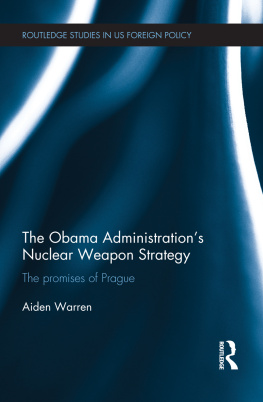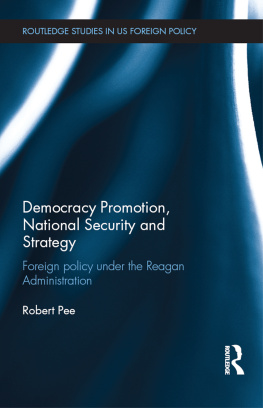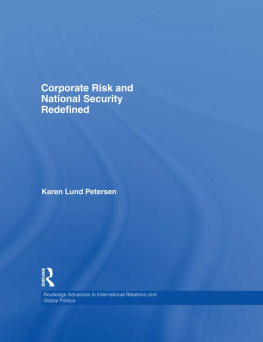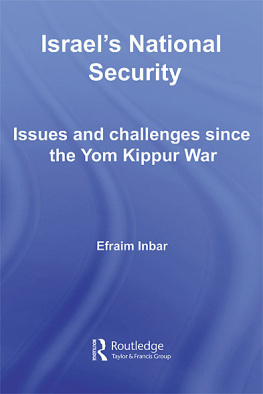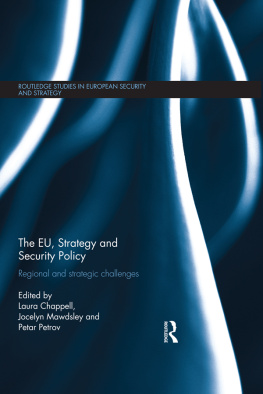ISRAEL FACING A NEW MIDDLE EASTThe Hoover Institution gratefully acknowledges the following individuals and foundations for their significant support of the
HERBERT AND JANE DWIGHT WORKING GROUP ON ISLAMISM AND THE INTERNATIONAL ORDER:
Herbert and Jane Dwight
Donald and Joan Beall
Beall Family Foundation
S. D. Bechtel, Jr. Foundation
Lynde and Harry Bradley Foundation
Stephen and Susan Brown
Lakeside Foundation
Nancy Doyle, M.D.

With its eminent scholars and world-renowned library and archives, the Hoover Institution seeks to improve the human condition by advancing ideas that promote economic opportunity and prosperity, while securing and safeguarding peace for America and all mankind. The views expressed in its publications are entirely those of the authors and do not necessarily reflect the views of the staff, officers, or Board of Overseers of the Hoover Institution.
www.hoover.org
Hoover Institution Press Publication No. 678
Hoover Institution at Leland Stanford Junior University,
Stanford, California, 94305-6003
Copyright 2017 by the Board of Trustees of the Leland Stanford Junior University
All rights reserved. No part of this publication may be reproduced, stored in a retrieval system, or transmitted in any form or by any means, electronic, mechanical, photocopying, recording, or otherwise, without written permission of the publisher and copyright holders.
For permission to reuse material from Israel Facing a New Middle East: In Search of a National Security Strategy, by Itamar Rabinovich and Itai Brun, ISBN 978-0-8179-2044-9, please access www.copyright.com or contact the Copyright Clearance Center, Inc. (CCC), 222 Rosewood Drive, Danvers, MA 01923, (978) 750-8400. CCC is a not-for-profit organization that provides licenses and registration for a variety of uses.
Hoover Institution Press assumes no responsibility for the persistence or accuracy of URLs for external or third-party Internet websites referred to in this publication, and does not guarantee that any content on such websites is, or will remain, accurate or appropriate.
Cataloging-in-Publication Data is available from the Library of Congress.
ISBN 978-0-8179-2044-9 (cloth : alk. paper)
ISBN 978-0-8179-2046-3 (EPUB)
ISBN 978-0-8179-2047-0 (Mobipocket)
ISBN 978-0-8179-2048-7 (PDF)
CONTENTS
PREFACE
D uring sixty-eight years of independent statehood, Israel has fought several wars and confronted a variety of national security challenges. The Israel Defense Forces (IDF) and other components of its formidable national security establishment have on the whole performed well under the direction of successive civilian governments.
The two of us spent decades observing and studying the making of Israels national security through our work in the IDF, Israeli diplomacy, and the academy. We were therefore delighted to be approached by Charles Hill with the idea of writing this monograph. Israel is currently contending with the challenges of the present turmoil in the Middle East equipped with a rich history of coping with military and security challenges and dramatic changes in its strategic environment. To characterize the current challenges, we decided to present briefly both the provenance of these challenges and the evolution of Israeli military-security thinking.
In this endeavor, we identified the analytical value of working at three levels: national security strategy (often referred to as grand strategy), the cabinet levels national security policy, and the IDFs military strategy. We were not surprised to find that for decades now, Israel has lacked a full-fledged formal grand strategy, that the cabinets formulation of national security policy is hampered by structural and political problems, and that the IDF has played the most effective role in formulating and executing an expanded version of its mission.
Israels national security landscape has been altered and transformed several times since 1948. In following these changes, we placed particular emphasis on two periods: the years 197982 (and their sequels) and the current Middle Eastern turmoil, which has exacerbated some threats facing Israel and has created new opportunities.
We both hope that this short study will encourage further discussion of the practice and theory of Israeli national strategy and national security policy and possibly also make a modest contribution toward taking advantage of the new prospects offered by this period of turmoil and change in the Middle East.
ITAMAR RABINOVICH and ITAI BRUN
August 2016
CHAPTER
THE EVOLUTION OF ISRAELS NATIONAL SECURITY DOCTRINE
D ifferent nations conceptualize, formulate, and discuss national security policy in different ways. The British government publishes a comprehensive annual report on national security strategy and a strategic defense and security review. The US government publishes periodically three different reports: the presidents National Security Policy of the USA, the Pentagons National Defense Strategy, and the Joint Chiefs of Staffs National Military Strategy. These two examples reflect both the looseness with which such terms as strategy, security, and defense are used and the substantive distinction among the levels of a nations strategy or national security policy: 1) national security strategy (sometimes referred to as grand strategy), the formulation of the countrys crucial national security interests and challenges and the broad policies pursued to protect them; 2) the governments translation of this national security strategy into national security policy (sometimes referred to as national defense policy); and 3) the implementation of this policy by the military leadership through the buildup and deployment of military force (national military strategy). Needless to say, this process and its products are not merely a top down development, but rather the outcome of ongoing interaction.
Israel is a country preoccupied, not to say obsessed, with national security challenges. It has developed formidable military and defense establishments that have been deployed over the past sixty-eight years in several wars and other military operations but has failed or chose to refrain from a systematic formulation, let alone discussion, of its grand strategy and national security policy. In Israels case, the objective difficulty of adapting strategy to an ever-changing reality has been compounded by the weakness or absence of institutions entrusted with these tasks. Israels original grand strategy was formulated by its founding father, David Ben Gurion, in his dual capacity as prime minister and minister of defense. The Security Review that he presented to his cabinet in October 1953 was, as will be shown below, a remarkable document. It underlay Israels national security policy through the Six-Day War in June 1967. The massive changes generated by that war and subsequent developments confronted Israel with new challenges and opportunities and produced a series of changes in Israels national security doctrine and practice. Over the years, several initiatives were taken to reformulate Israels national security doctrine. Most were not completed. Three of them, the Meridor Commission report and Chief of Staff Halutzs document in 2006 (both made available to the public), as well as



